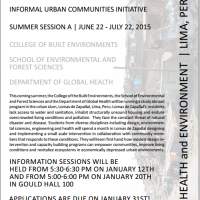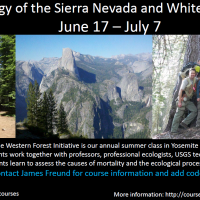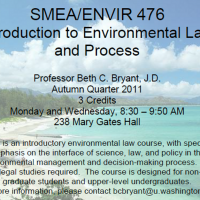Looking for a cool study abroad course for summer or thinking about a Capstone project? Check out this Design, Health and Environment experience in Lima, Peru. Deadline is January 31st.
*Class* General Studies 391G: Career Strategy and Job Search
*Class* General Studies 391G: Career Strategy and Job Search
General Studies 391G
- · Title: Career Strategy and Job Search
- · Winter 2015 SLN: 14728
- · Tuesday/Thursday, 2:30-3:20, LOW 105
- · Instructor: Patrick Chidsey (Career Counselor, Lead)
- · Credits: 2
- · Size of class: up to 50 students
This course assists juniors/transfer students/seniors (3rd…
[courses] English 471: Winter VLPA
Looking for a VLPA for Winter 2014 Registration? Check this out!
Winter 2015: English 471: The Theory and Practice of Teaching Writing (TuTh 2:30-4:20 VLPA; W option).
In Winter 2015, English 471 will be taught by Prof. Anis Bawarshi, who was Director of UW’s highly regarded Expository Writing Program for the last ten years. Through reading and fieldwork, English 471 introduces students to the various approaches that guide the study and teaching of writing, ranging from methods for teaching students how to produce texts to methods for assessing these texts. The course will also examine the research and theories that underscore these methods, assumptions that guide these approaches, and consideration of whose interests they serve, so that all members of the class can become more self-reflective readers, writers, and teachers. English 471 provides an opportunity to think about what it means to teach writing, to develop and share our own goals for teaching writing, and to generate and articulate practices that will help us achieve these goals. Coursework will include keeping a reading journal, conducting a brief teaching ethnography, preparing a bibliography and curriculum design presentation, and creating a teaching portfolio.
English 471 will have an optional service-learning component which will bring students! into local K-12 classrooms to practice work (three to four ho! urs each week) as tutors, mentors, and writing coaches. Those who opt to do service learning will have the option to register for additional credit hours of English 491, if they choose. For those who participate, the service learning in this course will fulfill 30-40 of the observation hours that students are required to complete prior to applying to the UW Masters in Teaching program. Information, and add codes for period 3, are available from the instructor: bawarshi@uw.edu.
[course]: Environmental Innovation Practicum (AUT/14)
ENVIRONMENTAL INNOVATION PRACTICUM (2 credits)
ENTRE 443/543, ENGR 498, ENVIR 495
Fall Quarter, Tuesdays 4-5:50 pm, Paccar Hall 292
Instructor: Deb Hagen-Lukens dlhagen@uw.edu
Prerequisites: None. Recommended for juniors and above, including grad students.
For a list of speakers and topic click here!
Discover the universe of cleantech solutions to our most pressing environmental challenges and raise awareness of how you can be part of the solution. You’ll form cross-disciplined teams around problems you identify, and present your solutions to the class. Although not required, teams are invited to compete in the newly named Alaska Airlines Environmental Innovation Challenge April 2, 2015.
The seminar consists of a selection of required readings and a series of industry experts who will speak on a specific cleantech topic. You will work in teams to present a proposed solution to an environmental problem. The final deliverable for the class is a 5-10 minute presentation.
Course topics include:
- · Environmental challenges and opportunities linked to cleantech.
- How to translate an idea into an actual device/product/company.
- Market assessment (who would be the customer for this product or service?)
Questions? ptufts@uw.edu
Pam Tufts| Assistant Director
Buerk Center for Entrepreneurship
Alaska Airlines Environmental Innovation Challenge
UW Foster School of Business, Dempsey Hall 227
206.685-3813 ptufts@uw.edu
ESRM 442: Forest Ecology of the Sierra Nevada and White Mountains: Summer 2014 (June 17 – July 7)
[course]: URBDP 498 A: Environmental Planning (3 credits)
URBDP 498/598 ENVIRONMENTAL PLANNING Spring Quarter 2014
GLD 102 Tue-‐‑Thu 10:00-‐‑11:20
Regime Shifts, Resilience, and Transformation in Urban Ecosystems
Marina Alberti
malberti@u.washington.edu
(206) 616-8667
DESCRIPTION
This course focuses on the integration of principles of ecosystem dynamics and resilience into
planning and decision-making. It is structured in 4 modules: 1) theories of environmental
planning, 2) methods of environmental assessment, 3) scenarios and models of coupled humannatural
systems, and 4) collaborative adaptive management and planning. Together these
modules are used to frame and address critical transitions and resilience in urban ecosystems in
the Puget Sound region. The course builds on complex systems theory and its application to
coupled human-ecological systems. Students learn techniques for developing scenarios, building
models, assessing resilience and devising management strategies. The course builds on a broad
range of approaches including strategic environmental assessment, place-based, life cycle, and
risk assessment, and adaptive collaborative planning.
PRACTICUM This year practicum will focus on Regime Shifts, Resilience, and Transformation
in Urban Ecosystems. We will explore regime shifts that are likely to occur in urban ecosystems
and examine the drivers, mechanisms, and functions that regulate system dynamic and their
impact on human and ecological wellbeing. Building on case studies of hydrological and
ecological regime shifts in urbanizing regions, we will develop hypotheses about what system
characteristics and qualities make cities more resilient to change. We will select case examples in
the Puget Sound region and test these hypotheses by exploring system adaptive capacities under
alternative future scenarios. The practicum will reflect upon and develop principles to translate
resilience science into strategies to enhance resilience in urbanizing regions.
PREREQUISITE: Introductory Environmental Systems class
For add codes: contact udp@uw.edu
Looking for a great class to round out your Winter Quarter 2014 schedule? Check this Planning and Permitting class out!
[course]: ENVIR 480 Topic for Spring Quarter: Greening up UW’s Investments
Spring 2013 ENVIR 480 Sustainability Studio- 5 credits
Topic: Greening up UW’s investments
Can UW’s investments be green? Earn course credit and gain professional experience while contributing to a hot topic among universities across the country. In Spring 2013 ENVIR 480 Sustainability Studio, students will engage in applied research about the environmental and social impacts of their personal investments, as well as provide analysis and insight to a UW discussion about the topic.
Did you know…the UW has an investment portfolio of over two billion dollars? This includes endowment investments of almost $13 million in sustainable industries and almost $200 million in sustainable forest lands. The UW encourages ethical considerations in its investing decisions, and investing in Sudan or in tobacco companies is prohibited. Should environmental impacts be considered? Meanwhile, there is discussion at UW about establishing “greener” options including a sustainability revolving loan fund for faculty and students to research campus sustainability solutions.
In ENVIR 480, we will explore potential green investing strategies, and their social and economic implications, for the University of Washington. Possible questions for student research projects include:
What strategies have other institutions used to green up their portfolios?
What are the likely financial, environmental and social consequences, both pro and con, of fossil fuel divestment? (a question being pushed by Bill McKibben, see http://gofossilfree.org/)
- What are financial implications for low-income and minority students?
- What are the possible financial returns of a sustainability revolving loan fund?
- How can more innovative sustainability initiatives be funded?
Students will partner with high-level financial administrators at the University of Washington, such as the Treasury Office, as well as environmental economics experts.
ENVIR 480
SLN: 13747
Class Date/time: Tues/Thurs 12:30-2:20, Wallace Hall (ACC) 120
Taught by Megan Horst, Teaching Associate in POE and pre-PhD in Urban Design and Planning
Open to all majors/no prerequisites- Only an interest in sustainability. Capped to maintain small class size.
There are still spots available in this great autumn quarter class. Check the time schedule for meeting times and SLN codes for registration.
This course can count towards the ’Policy and Decision-making’ requirements of the Environmental Studies major or minor.




